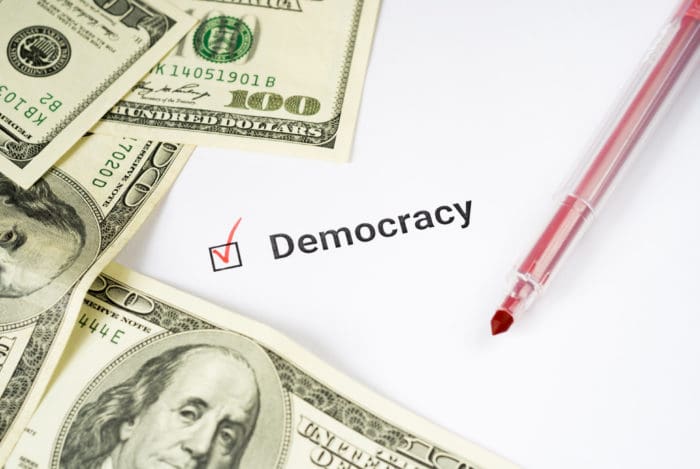We are constantly told that it is only big money that counts in politics. Perhaps this is so. But what if that’s merely an intimidation tactic? By convincing your enemy that you have the invincible weapon, your enemy will shrink from the fight.
The gun controllers have long complained that the big money of the evil gun industry controlled Congress-critters with lavish contributions. We know this is nonsense. The NRA didn’t buy a Congressman with a couple thousand bucks. It welded it’s influence by publishing letter-grades to its members who numbered no more than five million.
Today, the NRA has been reduced to a tottering shell of what it once was. It will take decades for it to be rehabilitated into something approaching its youthful vigor. Still, there is something to learn here.
It is said that all politics is local. That’s probably true. And, until recently, we have held faithfully to the belief that the only signature that ultimately matters is the one we give the polling official before being handed a ballot. How can we form that into a coherent tactic?
It dawned on me that the occasional checks I’ve sent to political campaigns might have gone for naught. Once the checks were cashed, the candidate lost track of any association between my contribution and my sentiments.
One hundred of us People of the Gun might each send a $100 check to a campaign, but the cumulative effect would be lost. Suppose, instead, that we pooled our checks and a representative of us — a “bundler” — delivered the entire $10,000 amount to the candidate with a message. That message just might register.
The message is that there is $10,000 and 100 votes behind a sentiment. Ignore that sentiment at your peril.
Concentrating our political clout in one iron fist at the national level might have proven to be a strategic mistake. We gave the gun-controllers a singular target to demonize and take all the flack. Perhaps that was actually an un-forced error.
As a thought experiment, imagine an entirely different tactic. Suppose, instead, that the NRA never gave a dime to any candidate. Suppose it never published a letter grade for a single politician.
What if, instead, it merely accepted the invitation to take a seat at the table in Washington. Suppose it evaluated the Congress-critters’ responsiveness to the support of gun rights and quietly fed its observations back to its 50 state affiliates.
The state affiliates might then have contributed to local candidates in their own states and in neighboring states where their members hunted and competed. The state affiliates might have sent their own letter-grades to their members. Would the Buckeye Firearms Association (or any of it’s 49 sister organizations) have taken a fraction of the Alinskyite fire suffered by NRA?
Take it down another level. Suppose the contributions and letter grades had originated from the Toledo Rod & Gun Club or Cincinnati League of Sportsmen. Local club chairmen would have had vastly more influence over their own Congressman than from even a state affiliate delegate. That would make it impossible for gun controllers to isolate, personalize, and demonize hundreds of local sports associations with the kind of concentrated fire and vitriol that’s been aimed at the NRA.
How about fund raising? When your local volunteer fire department holds its annual “boot day” contribution campaign can you resist the invitation to drop $10 in the boot of the fire-fighter whom you might one day “invite” to save your home? When you hear from your local club officers that a local candidate is good or bad on an issue pertinent to your local interest, would you pay attention?
In Senatorial campaigns, it’s likely that state affiliates would need to take the lead. Nevertheless, each Senator is much more concerned with turnout in some key localities than others. Targeted message enforcement from local clubs would have a salutary impact.
The 50 state affiliates would retain their singular identities and independent internal politics as well as responsiveness to the members in their states. Moreover the networking among their leaders has been well established incidental to their activities at the national level.
The challenging political environment we face — in civil politics and in private association politics — seems to warrant an outside-the-box approach. Perhaps we ought to turn our attention to our respective state NRA affiliates and local clubs as focal points to concentrate our money and influence.
I’m speaking here of the state NRA affiliates and municipal sportsmen’s clubs figuratively, not literally. In any given state or locality, these organizations might be stymied by their own internal charters or politics. The important key is locality.
In Eastern Pennsylvania, the Lehigh Vally Tea Party seems to have become a force to be reckoned with in the Congressional districts where its members reside. It matters not at all that some such organization has nothing at all to do with the NRA or the shooting sports. What matter is that it makes its sentiments about Second Amendment rights known to the politicians it courts.
The practice of “bundling” is not as tightly regulated as are Political Action Committees. The point – or points – are that the message is delivered along with a stack of checks wrapped in adding machine tape with a total.
What counts is the total at the bottom and the number of checks where the latter represents actual votes. What we can’t influence individually — not even in the aggregate — we might very well be able to accomplish if we find a method for focusing our strength on the right targets and in a concentrated beam.
